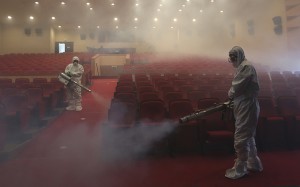South Korea Combats Deadly Disease
June 12, 2015
Health officials in South Korea this week sealed off staff and patients at two hospitals in the latest effort to stem an outbreak of a deadly respiratory disease called Middle East Respiratory Syndrome (MERS). By mid-June, more than 128 people were known to be infected with the contagious virus and at least 13 had died. Patients at the two hospitals are not allowed to leave their rooms; doctors and nurses, clad in protective clothing to prevent infection, care for them.

Workers wearing protective gear spray antiseptic solution as a precaution against the spread of MERS at an art hall in Seoul, South Korea, June 12, 2015. (Credit: AP Photo)
MERS is a severe, sometimes fatal, respiratory disease first identified in the Middle East. The disease was discovered in 2012 after a patient in Saudi Arabia died of the then-unknown respiratory illness. Symptoms of MERS include fever, cough, and shortness of breath, which sometimes progresses to pneumonia. About 30 percent of the patients infected with the disease in the Middle East have died. No vaccines or drugs are yet available to prevent or cure MERS. Treatment of infected patients mainly involves relieving the symptoms of infection.
Cases of MERS are known mainly from Saudi Arabia, Qatar, Jordan, Oman, the United Arab Emirates, and Egypt. Doctors believe the outbreak in South Korea originated with a person who had recently returned from a trip to the Middle East. In 2012, scientists identified the cause of MERS as a previously unrecognized variety of coronavirus, designated MERS-CoV. In human beings, coronaviruses are among the many viruses that cause common colds. MERS-CoV is classified in the same family as the coronavirus that causes SARS, a respiratory disease that caused panic in 2003 when an outbreak occurred in Asia. Scientists believe that dromedary camels are the likely source of the MERS-CoV. They have isolated strains of viruses that are genetically similar to MERS-CoV from camels in the Middle East. The disease can be transmitted to humans who come into contact with camels or such camel products as unpasteurized milk and undercooked meat.
To stop the spread of MERS, health officials in South Korea have closed thousands of schools and quarantined more than 2,500 people who may have been exposed to the virus. Individuals quarantined are asked not to leave their homes. Health officials are monitoring the quarantined population remotely through the use of smart phones and social media.
Other World Book articles:


